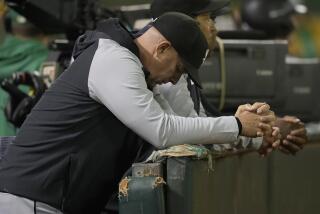‘85 Pirates: They Don’t Get Much Worse
- Share via
PITTSBURGH — The 1985 baseball season brought the worst of times and the worst of teams to the Pittsburgh Pirates, whose major league-leading 104 losses were the most for a Pirates’ club in 32 years.
“Joe Garagiola makes a living telling stories about that team,” said former manager Chuck Tanner of the 1953 Pirates, who also lost 104 games.
But Tanner, fired Monday after nine years as the team’s field boss, considers his Pirates’ just-concluded season nothing to laugh about.
The Pirates, supposedly refortified offensively by a series of off-season deals completed by since-ousted General Manager Harding (Pete) Peterson, became the National League’s standing joke with a team that:
--Has exited last place in the National League East only once in the last 17 months.
--Had six starting shortstops before the Fourth of July.
--Never had a winning streak longer than three games.
--Had only two crowds of more than 20,000 people in Three Rivers Stadium.
--Had only two pitchers post more than five victories on a staff that led the National League in earned-run average in 1984 but was last this season.
--Had no player hit more than 12 home runs.
It was a bad year for nearly everyone who wore a Pirate uniform. Even the team’s popular Parrot mascot, Kevin Koch, quit in mid-season after becoming involved in a highly publicized federal drug probe.
The Pittsburgh-based investigation, which rocked baseball for weeks, revealed that several Pirates developed severe cocaine problems less than a year after “The Family” won the 1979 World Series.
“This season began under a cloud . . . people were asking our players not about baseball, but about drugs,” Tanner said. “It had to affect the way we played.”
What Peterson called in spring training “the most important season in Pirates’ history” almost became their final season.
Amid rumors the financially strapped team ultimately would be sold to out-of-town buyers, frustrated club owners John and Dan Galbreath waited nearly a year before finding local buyers, a private-public coalition headed by several corporate leaders and Mayor Richard Caliguiri.
The Pirates’ future in Pittsburgh apparently has been decided for the time being, but the team’s on-field future--Tanner predicts they can become pennant contenders by 1987--is a matter of considerable conjecture.
So was Tanner’s fate, until he was told his services were no longer wanted by a new management team headed by incoming team President Malcolm (Mac) Prine.
“We have a new attitude, a different attitude on this team,” Tanner said after interim General Manager Joe L. Brown swung a series of trades that rid the team of grumbling veterans such as John Candelaria, George Hendrick and Bill Madlock.
Brown had openly questioned the commitment of some of the highly paid veterans before dealing them away for younger players who likely will be the nucleus of what is being called the “New Attitude Pirates.”
Mike Brown, a promising outfielder, hit .332 with five home runs and 33 runs batted in after being obtained in early August. Outfielder R.J. Reynolds hit .308 over the final month after spending most of the season on the Dodgers’ bench.
Brown and Tanner also were pleased with the late-season progress of rookie shortstop Sammy Khalifa, first baseman Sid Bream and the year-long play of rookie outfielder Joe Orsulak, who batted .306.
“We now have young players who not only want to play well, but want to play for the Pittsburgh Pirates,” Brown said.
The Pirates’ biggest surprise was pitcher Rick Reuschel, released last fall by the Chicago Cubs after four years of arm trouble. At age 36, he regained not only his health, but his fastball and his control and posted 14 of the Pirates’ 57 victories after beginning the season in the minor leagues.
Reuschel wasn’t around for the Pirates’ opening day loss to the Chicago Cubs. But many of those who were no longer wore Pirates’ uniforms in a season-ending loss Sunday to the Philadelphia Phillies.
Peterson and Brown made a combined 41-player moves, but many of the players obtained to fill key roles--Hendrick, Steve Kemp, Sixto Lezcano, Tim Foli--were either gone or relegated to the bench by early October. Also dealt away was pitcher Rod Scurry, the last remaining link between the Pirates’ clubhouse and the federal drug probe.
More to Read
Go beyond the scoreboard
Get the latest on L.A.'s teams in the daily Sports Report newsletter.
You may occasionally receive promotional content from the Los Angeles Times.









